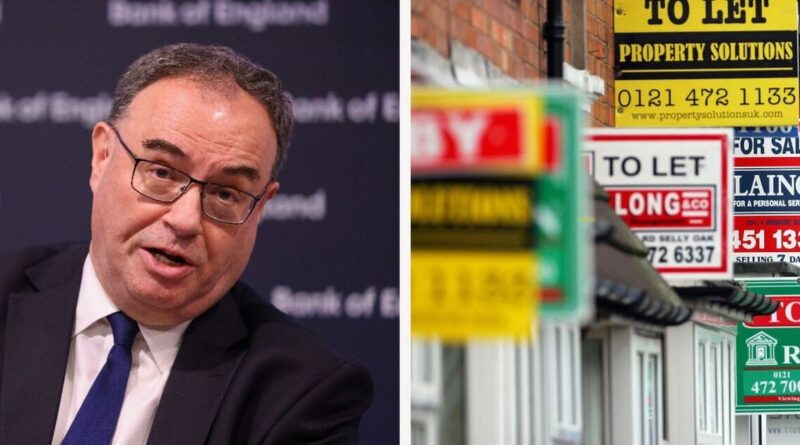‘Rollercoaster’ mortgage market continues as two lenders hike rates | Personal Finance | Finance
Barclays and Halifax have joined the pack of high street banks hiking mortgage rates ahead of the Chancellor’s looming “painful” budget.
The two major lenders announced the new charges following in the footsteps of Natwest, Santander and TSB who also upped borrowing costs this week.
Rates are rising despite the Bank of England revealing a surprise three-year low in inflation down to just 1.7 per cent.
A mortgage expert told the Daily Express that the market for borrowers remains something of a fairground ride.
David Hollingworth, from L&C Mortgages, said there had been some “mixed messages” from the Bank of England and “uncertainty” ahead of Chancellor Rachel Reeves’ Budget on October 30.
Sir Keir Starmer has previously hinted Labour’s first major monetary announcement would be “painful” for the British public.
Mr Hollingworth said: “The current mortgage market has been a roller coaster, and the ups and downs continue, the general trend had been for fixed rates to be coming down, and that was because market expectation of how quickly the base rate may start to drop was improving.”
Experts believe lenders have been putting up rates as a reaction to an increase in Sonia swap rates, the name for the inter-bank lending interest. When Sonia swap levels go up it often causes fixed mortgages to increase, and vice versa if they fall.
Mr Hollingworth added: “Now that’s just had a bit of a stutter in recent weeks and that’s pushed up the rates for lenders in terms of funding, so these increases are now what’s reflecting some of those changes.
“In the last two weeks we’ve started to see more of a turnaround, whereas it had been all downwards and pretty much one-way traffic over the last couple of months, in the last couple of weeks it’s started to turn around and now we are seeing rates rise.
“The good news is, inflation this week is lower than anticipated so that’s helped to ease Swaps back a little bit and that should help steady the ship, but there will always be something of a lag factor in this.”
Across Barclays fixed rate options it appears the rate will increase by 0.2 percentage points, according to analysis by ThisisMoney.co.uk.
The bank does however boast the second-lowest five-year fix with at least a 40 per cent deposit. As of today (Saturday) the deal rises to 3.96 percent.
For those with a 25 percent deposit, it will go to 4.05 percent, while for those with 10 percent deposits, it’s expected to hit 4.59 percent.
The website adds that Halifax has also hiked up the points on its two and five-year fixed products with between 0.11 and 0.24 increases.
On two-year fixed options only, Santander and Nationwide offer deals now below 4 per cent. Mr Hollingworth added that he believed the rises were a “market adjustment” and not a “mini budget panic situation”.
He continued: “There is uncertainty, it’s hard to know why Swaps have gone up as they have, particularly with the Governor of the Bank of England, Andrew Bailey, saying we may have the ability to cut interest rates quicker, but then his colleague Huw Pill said we might not. So, there’s sort of mixed messages.
“From a borrower’s perspective if they were holding off thinking rates just keep coming down, it’s a little bit of a reminder that it’s not guaranteed to be one-way traffic and there will be little ups and downs along the way.”
Toby Leek, NAEA Propertymark President, said the housing market was effectively a canary in the mine for the health of the economy.
He said: “The housing market is always a close indicator of wider economic health and with inflation now sitting below the targeted rate of two per cent and strong hints we may see a base rate cut from the Bank of England early next month, we are currently seeing lenders fine tune their current mortgage offers on an almost daily basis.
“Although consumer confidence and affordability has vastly progressed since the start of the year, we are still in a phase of caution where lenders need to take a very balanced and careful approach regarding what is sensible and realistic currently.”
UK inflation this week fell below the Bank of England’s target rate of two percent, potentially signalling a cut in interest rates next month, economists have said.
The heavier-than-predicted fall is expected to add pressure onto Bank of England rate-setters to cut interest rates, which had been hiked in recent years to bring inflation down to the two percent target.
Policymakers at the bank’s Monetary Policy Committee (MPC) will decide whether to reduce interest rates – which help set mortgage and borrowing rates – from their current five percent level at a meeting next month.
Thomas Pugh, economist at RSM UK, said: “The sharp drop in inflation to just 1.7 per cent, the first sub 2 per cent reading since April 2021, effectively nails on a 0.25 percentage point rate cut next month.
“Inflation will rebound a little from here as base effects and higher energy prices take effect, but it will stay below 3 per cent and slowing services inflation will allow the MPC to gradually cut interest rates over the next year.”




